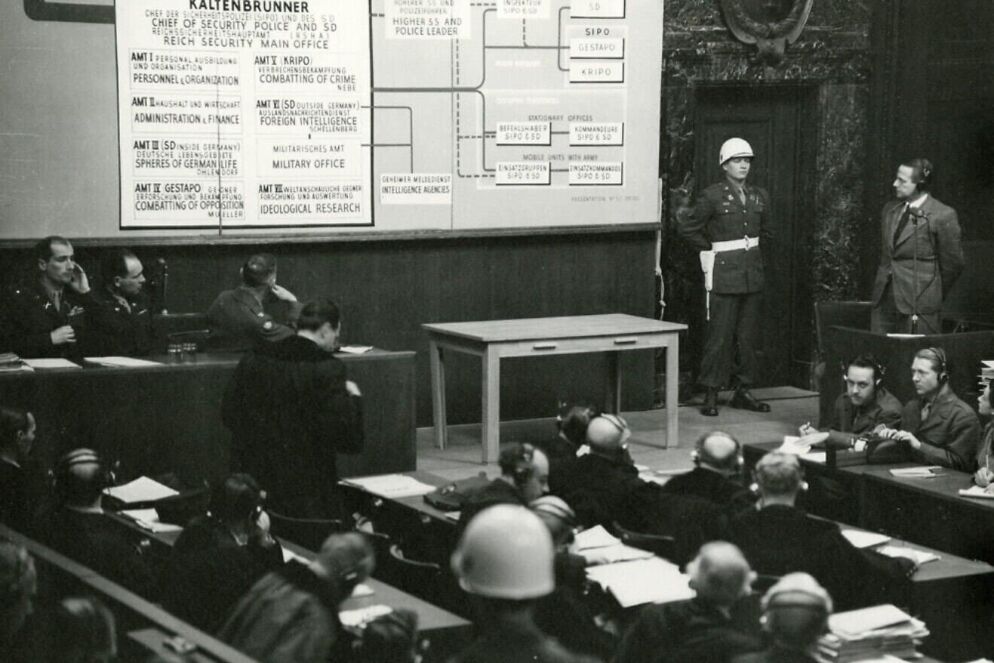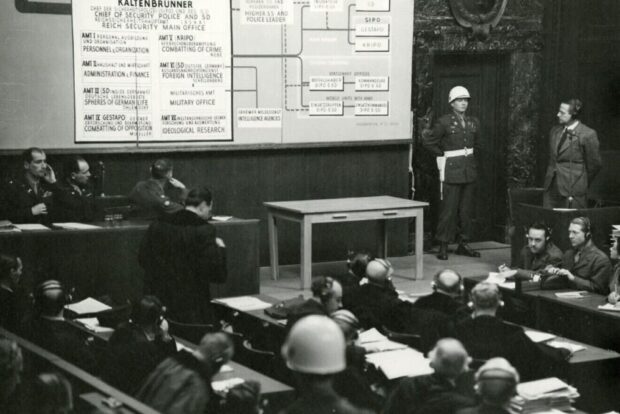
Einsatzgruppen commander Otto Ohlendorf stands in the witness box during a International Military Tribunal in Nuremberg, Germany on Jan. 3, 1946. (Photo credit: United States Army Signal Corps. via Harvard Law School Library and Wikimedia Commons via JNS)
By Richard D. Heideman and Irwin Cotler
This year marks the 90th anniversary of the passing of the Nuremberg Race Laws, legislation that stripped Jews of their rights and codified Nazi racial hatred. Those laws became the legal foundation for genocide.
In that same city a decade later, justice was born at the commencement of the Nuremberg Trials, where the world declared that crimes against humanity would not go unpunished. Nuremberg thus stands as a symbol of history’s starkest duality: the Nuremberg of hate and the Nuremberg of justice.
Almost 10 years ago, on the 80th anniversary of the passing of the Race Laws (which were implemented in 1936 after the Berlin Olympics) and the 70th anniversary of the Nuremberg Trials, we were privileged, along with professor Alan Dershowitz, to chair the International March of the Living Nuremberg Symposium featuring legal scholars, justice ministers and human rights advocates at the Jagiellonian University in Krakow, Poland, to confront this dual legacy.
The Nuremberg Symposium was subsequently published by Loyola University School of Law as a special edition of their International & Comparative Law Review on the Nuremberg Laws and the Nuremberg Trials. More than 23,500 people have downloaded this March of the Living Holocaust education tool.
As participants prepared for the 2016 March of the Living, we issued a 12-point “Never Again Declaration,” a blueprint for confronting antisemitism. Today, as antisemitism surges to levels not seen in generations and Holocaust denial spreads at digital speed, the anniversaries of 1935 and 1945 compel us to act.
The Supreme Court of Canada said: “The Holocaust did not begin in the gas chambers. It began with words.” Those words ring especially true today. Hate speech metastasizes online, amplified into what scholars call “viral antisemitism.” Predictably, dehumanizing words are followed by violent deeds — from the streets of Charlottesville, Virginia, to political rallies, and from social media echo chambers to university campuses.
Our 2016 declaration (envisioned and authored by Cotler) described antisemitism as “the oldest and most enduring of hatreds,” warning that “while it begins with Jews, it does not end with Jews.” That warning has proven chillingly accurate. Although Jews make up just 2% of the U.S. population, FBI data shows they were the target of nearly 70% of all reported religion-based hate crimes in 2024, yet another year of rising assaults.
Equally disturbing is how antisemitism has mutated in the digital age. Old lies are repackaged in memes and hashtags. The grotesque inversion that Israel is a Nazi state, which our declaration identified as “itself a form of Holocaust denial,” has become pervasive.
The barbaric Hamas-led attacks in southern Israel on Oct. 7, 2023, and the ensuing war in the Gaza Strip poured fuel on these fires. University campuses, once bastions of open inquiry, have become battlegrounds where Jewish students face harassment and intimidation. Terrorism is glorified; Jewish suffering is dismissed. This is what happens when hatred is left unchecked.
Almost 10 years ago, we warned that “Never Again” must not become an empty slogan. It had to be an instruction for action. The decade since has proved the prescience of that warning and the difficulty of turning remembrance into prevention.
Progress has been made as dozens of governments have adopted the International Holocaust Remembrance Alliance’s working definition of antisemitism, Holocaust education has spread, and hate crimes are more often prosecuted. Yet major gaps remain, one of which is the lessons to be learned from unchecked state-sponsored and legalized hate, often under the guise of freedom of speech, but based upon pure discriminatory conduct toward the Jewish people and those who support the only Jewish state.
In an interconnected world, hate speech crosses borders instantly, and terrorist groups organize globally. Efforts to confront them must also be global. Encouragingly, a few steps have moved forward: the Abraham Accords; organizations such as the Global Imams Council, which has issued declarations against antisemitism; interfaith initiatives; and civil society organizations building monitoring, security, educational and defense systems. Far more, however, is needed, including stronger enforcement of hate-crime laws; sustained investment in Holocaust education; meaningful accountability for social-media platforms; and for the United Nations itself to cease the incessant battering and demonization of Israel.
Ninety years after the Nuremberg Laws and nine years after the symposium in Krakow, the message could not be clearer: “Never Again” must be a call to action, not a memorial refrain.
We must recommit to the vision of justice and human dignity that rose from the ashes of the Holocaust. The dual legacies of Nuremberg, its hate and its justice, still speak to us. How we respond will shape not only the future of Jewish communities, but of all communities threatened by racism, hatred and violence.
Richard D. Heideman is the Washington, D.C., attorney representing American Victims of Terror and the founding chair of The Israel Forever Foundation. Irwin Cotler is the founder and chair of the Raoul Wallenberg Centre for Human Rights.

